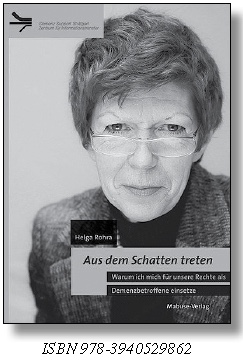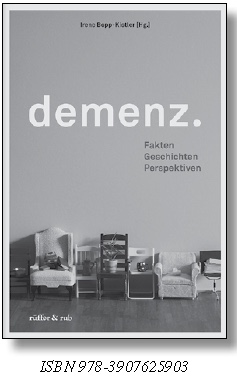Dementia – a disease difficult to comprehend
Dementia – a disease difficult to comprehend
by Rita Brügger
In most cases tentativeness or timidity causes that we sidestep issues like incurable diseases. It is usually insecurity or timidity that makes us sidestep. How should I face the affected person and his or her relatives? Dementia also belongs to this category of taboo topics, which one would often rather ignore than deal with.
But reality confronts you directly. In your neighbourhood and circle of friends, there are people with parents or dependents some of whom are no longer able to master their everyday life or to settle their affairs. Some worry about the loss of their memory. Others already have a clear diagnosis: dementia. As they get older, many people wonder what will happen if they no longer recognise their loved ones or even know themselves. Or vice versa, if their partner no longer recognises them?
Lately, there has been an increase of reports that no longer disregard dementia, in radio, television and magazines. And some take it up in a way that is understandable and illuminating to the layman. This provides an opportunity to deal with the topic of dementia without feeling overwhelmed by the gravity of this disease and its consequences. The knowledge of the very different forms this often alarming disease may take inspires courage, and creates understanding towards fellow human beings who are experiencing hard times because they have been diagnosed with dementia.
“Yes to life despite dementia”
In the context of the “Forum for Contemporary Witnesses” in Aarau, a remarkable event under this title recently took place, and met with broad interest. The specialist in internal medicine with a focus on geriatrics, Dr med Irene Bopp-Kistler gave a lecture in the evening. She runs the Memory Clinic at Waidspital Zurich. The second speaker was Ms Helga Rohra from Munich, former interpreter, book author, and affected by dementia.
With their great expertise and the background of their own experience, both women gave the listener a good insight into a topic which is all but easy. Despite the topic, the evening gave everyone a lot of hope, and there was no sadness, as an uninvolved person might suspect.
Dr Bopp created the basis for understanding this complex subject with expert information easy to understand for the layman and with many practical examples. She sensitively reported on very different courses of the disease and the fate of patients and their relatives.
Ms Helga Rohra said with a slight amusement that she was able to celebrate a jubilee this year. For it was 10 years ago, when she was 53 years old, that she was diagnosed with a form of dementia bearing the exact name of “Levy Body Dementia”. The translator working on international medical congresses went through a very rough patch, mainly in the time shortly after the diagnosis. It started with difficulties in finding the right words. Then Ms Rohra was no longer able to complete whole sentences. Even her sense of orientation left her, so that at times she did not find her way home. Worst of all, however, was the incomprehension of some doctors who did not understand her case.
Today, Helga Rohra chairs the European Working Group of People with Dementia, which supports the needs of dementia patients. She is a fighter who does not give up, but gives lectures and has written two books, of which she herself says that they should give insight into her emotional world as a person affected by dementia.
Understanding persons with a disease
For every patient, especially one who is diagnosed with an incurable disease, an understanding environment is very important. Giovanni Maio, doctor and philosopher, devotes a whole chapter to dementia in his book “Den kranken Menschen verstehen. Für eine Medizin der Zuwendung” (“Understanding persons with a disease. Plea for a medicine of caring and attention”). Although he knows that the diagnosis of dementia is a traumatic stroke of fate that cannot be glossed over, the experienced doctor knows that there can certainly be a life of hope even with dementia. So Maio says that every person is and remains unmistakable, everyone delights in different things. Dementia patients are sensitive and need understanding and attention and to be shown what they still can do. Maio points out that feelings and intuition are often neglected in our cognitive image of man. He quotes Schopenhauer: “The man is in the heart, not in the head.”
Also Dr med Bopp-Kistler from the Memory Clinic at the Waidspital Zurich emphasises the importance of a sympathetic ear and of the focus on what is still possible. The doctor explains in a TV report that she is absolutely honest in the diagnosis. But then, in the further support and company offered to dementia patients, she seeks ways and means of strengthening the persons concerned in doing what is still possible for them and of showing them perspectives for a meaningful life with dementia. In her book “Demenz. Fakten, Geschichten, Perspektiven” (“dementia. Facts, stories, perspectives”) the reader gets an in-depth look at the different types of dementia. The diverse contributions of people who are affected themselves or as relatives, the medical and therapeutic companions, who all have their say in the book, paint a colourful picture of dementia. Although it is considered a reference book and has over 600 pages, it is also easy to understand for a non-specialist.
New opportunities
In his book “Nie waren wir uns so nah. Wie ich meinen demenzkranken Vater nochmals neu kennenlernte, als ich ihn pflegte” (“Never have we been so close. How I learned new things about my father suffering from dementia when I cared for him”), Joachim Schaffer-Suchomel described how the relationship between father and son changed completely when he took care of his father, who had dementia. The somewhat stubborn former headmaster and his son find a new, emotional relationship despite many difficulties that come with the father’s illness, or maybe just because of it. With humour Schaffer describes all stages of the disease and care until death, often accompanied by helplessness and anger, but ultimately achieving an intimate connection of the two men, which he had never experienced before.
Helga Rohra, too, has been looking for new opportunities as a victim. She is no longer able to practice her demanding profession of interpreting because of her dementia, and yet she has never seen any reason to give up. It was imperative to her to make herself useful. Through a support group, she found contact with people who wanted to provide a forum for dementia patients in a magazine. Helga Rohra gave a first interview, under the pseudonym Helen Merlin. Then followed an article in Spiegel magazine. In 2010, she participated in an Alzheimer conference and spoke as a person concerned. In the meantime she has written two books: “Aus dem Schatten treten. Warum ich mich für die Rechte als Demenzbetroffene einsetze” (“Stepping out of the shadows. Why I am committed to the rights of persons affected by dementia”), and “Ja zum Leben trotz Demenz! Warum ich kämpfe” (“Yes to life despite dementia! Why I fight on”), which impressively document what a dementia patient has to contend with, but how fulfilled his of her life can continue to be.
“Dement, but not bonkers. For a new approach to dementia patients”
Under this title appeared the book by dementia specialist Michael Schmieder, longtime head of the dementia centre Sonnweid in Wetzikon. Schmieder advocates unconventional but honest treatment of dementia patients. He does not believe in simulated railroad cars in which films like train rides are played. In the Sonnweid, there are no closed doors, because Schmieder knows that people with dementia have a strong urge to move. So there is access to all the rooms of the home. It is made possible for each resident to do what he is still able to do. Some prepare the vegetables; others may accompany the person who goes shopping, even if one of the still sprightly ladies may put her finger in the yoghurt to be bought.
Schmieder’s book is informative and cheerful. The reader feels that if the necessity should arise, he would want to be in just such good hands as the inmates of the Sonnweid seem to be.
Finally another interesting book should be mentioned: Arno Geiger, “Der alte König in seinem Exil” (“The Old King in His Exile”). In this book, the Austrian writer Arno Geiger from Vorarlberg describes the story of his father, who suffered from dementia. First, the relatives do not recognise the disease, but accuse the aging man of “getting negligent”. But then the family gradually closes its ranks, and the father is accepted with his illness. His children and his wife take care of him in turns for a long time, until admission to a nursing home becomes inevitable. In an empathetic way, the son describes how the disease affects his father. There are tragic moments in this life story, but also happy ones. And all of them enrich the everyday life of the family.
Facing new challenges
Fortunately, today the focus relating to dementia patients is increasingly no longer simply in “providing for” the patient. More solutions are being sought where those affected can be accompanied lovingly and are enabled and allowed to participate in society. And by all means, the report in the journal Zeitlupe No 1–2/2018 is also encouraging. It reports on the farm Obergrüt in Sigigen LU, where younger dementia patients are presented with a meaningful work opportunity in an affectionate environment. •

